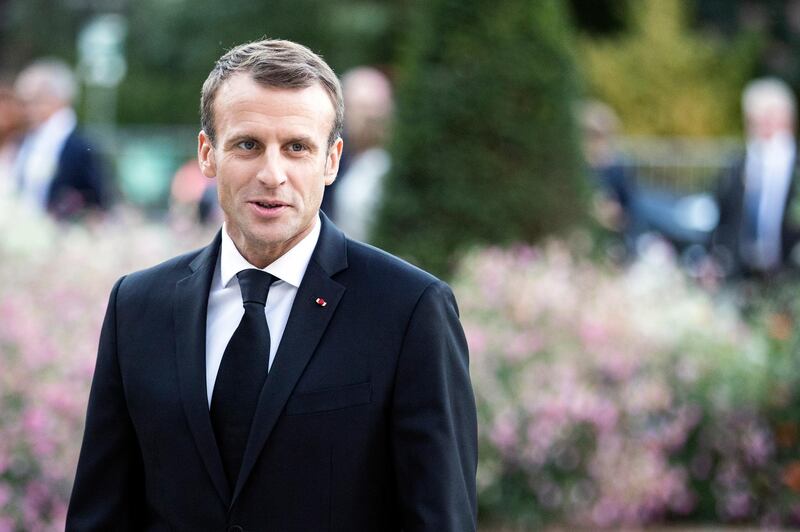The president of France, Emmanuel Macron, has managed the near impossible – he is now more unpopular than his hapless predecessor, Francois Hollande, was at an equivalently early stage of his term in office. The decline in Mr Macron’s ratings has been vertiginous. Eighteen months ago, he won the Elysee with 66 per cent of the vote, but according to the latest poll, a mere 29 per cent of his countrymen are now satisfied with his leadership, down from 39 per cent two months ago.
The proximate cause of this slide is a series of damaging resignations from Mr Macron’s cabinet and a scandal over one of his bodyguards attacking a protester. But some of us always thought that this emperor – and Mr Macron has certainly embraced the imperial nature of the Fifth Republic’s presidency, designed to fit General Charles de Gaulle’s lofty sense of destiny – never had any clothes in the first place.
True, he did seem to come from nowhere. He had briefly been Minister of the Economy under the previous socialist government. However, before winning the presidency – and a majority in parliament for his newly created party La Republique En Marche! – Mr Macron had never been elected to anything. He was fortunate that the two mainstream parties, the Socialists and the centre-right Republicans, had virtually imploded in the case of the former, and were tarnished by scandal at the top in the latter.
As I have argued before, for Mr Macron to win only 66 per cent of the vote in the second round of the presidential election, when his sole opponent was the far-right Front National's Marine Le Pen, was not a victory to boast about. Why didn't he crush her, as Jacques Chirac did her father, Jean-Marie Le Pen, in 2002 with a massive 82.2 per cent of the vote?
The answer is that possibly more people than were credited realised that his supposedly bold new vision of a radical centrism, which was supposed to break the mould of French politics, was vacuous nonsense.
As the late Roy Jenkins, one of Britain’s most storied post-war politicians, put it in a speech in 1973: “There has been a lot of talk about the formation of a new Centre Party. Some have even been kind enough to suggest that I might lead it. I find this idea profoundly unattractive ... I do not believe that such a grouping would have any coherent philosophical base.”
The emptiness of Mr Macron’s centrism was not the worst of it. That it turned out to be yet another example of a right-wing, free-market, globalist agenda being given a vaguely left-wing lick of paint, then repackaged as something new and exciting, however, was. His “reform” agenda – which favours the rich and risks the security of workers and pensioners – is certainly in the tradition of the “third way” once associated with leaders such as Tony Blair and Bill Clinton.
Mr Macron is at least a generation out of date. People have seen the results of this “triangulation”, or abandonment of core beliefs, and have had plenty of time to rue the results: the tragedy of a UK Labour government, under Mr Blair, ending free university tuition, one of the many ways it undermined the pillars of the welfare state; the terrible irony of a Democratic president – Mr Clinton – signing a crime bill that led to the mass incarceration of African Americans; and the utterly misguided equation of the “free market” with the “perfect market”, which led to the 2008 financial crisis and the devastation from which so many countries have still not recovered.
These failures have fed the growth of parties and tendencies that convey real conviction and proclaim an unshakeable desire to act on behalf of the people. We see this in the rise of such genuinely socialist parties as Syriza in Greece and Podemos in Spain, in the election of Jeremy Corbyn as leader of the UK’s Labour Party, and in the passionate support of Senator Bernie Sanders and, more recently, Alexandria Ocasio-Cortez in the US.
On the right, nationalism has reasserted itself. That this has led to intolerant and xenophobic governments, and not just in eastern Europe, is to be regretted. But those on the left must recognise that they have forgotten for too long that millions are moved by a decent and fair-minded love of country, and want to see all their fellow citizens taken care of by a state that is unashamed to fight for them. Not all want to be "citizens of the world" – or "citizens of nowhere" as UK Prime Minister Theresa May put it. A more traditional – and yes, more nationalistic – conservatism can also speak to the masses more persuasively than a neoliberalism that believes their needs will be taken care of merely by lower taxes and fewer regulations.
Mr Macron is certainly a talented and remarkable man. He could not have got so far, so fast without being so. France's hidebound economy also undoubtedly requires reform. But with his background as an investment banker and his tone-deaf attitude towards those left behind – he recently told an unemployed gardener he could find a job just by crossing the street – he appears disconnected from the aspirations of and the dire challenges facing ordinary people.
Clinging, as he does, to an outmoded ideology that has failed, and failed badly, he is a man out of his time. His ratings will not improve unless he abandons his position for a politics that puts people first – and puts markets in their proper and very distant second place.
Sholto Byrnes is a senior fellow at the Institute of Strategic and International Studies Malaysia





